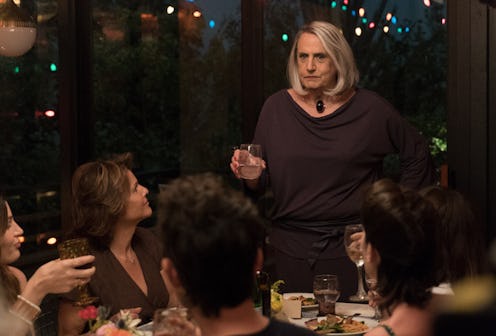Entertainment
'Transparent' Shows A New Trans Experience

Transparent's return to Amazon for Season 3 promised plenty of episodes to catch up with the Pfefferman clan. So, imagine my surprise when the third season in the streaming series opened with barely a reference to the larger family that makes up the fabric of the series. Instead of focusing on the Pfeffermans as a whole, Transparent 's Season 3 premiere episode "Elizah" was told mostly from Maura's perspective. Though Maura is the "trans parent" from which the series gets its name, her journey is often given the same weight as her childrens' self-discovery arcs. Yet, in "Elizah," viewers got to see a glimpse of another trans experience — one that wasn't Maura's. Maura met a young trans woman in the new season's premiere episode, and it shed light on a very different — and very important — experience.
Maura first spoke with Elizah while working at the LGBTQ center's crisis hotline. Though most of her calls had been hangups or pranks, her call with Elizah was the real deal. Elizah, a black trans woman with bright green hair, called the hotline in a moment of desperate sadness. After going to a clinic and being denied service, Elizah asked Maura why she should go on living when her foster parents don't care about her and living as her authentic self becomes more and more of a struggle everyday. Maura tried to relate to Elizah, telling the troubled teen that she was a trans woman as well. However, it quickly became evident that Maura and Elizah's experience were very different.
As an adult from a privileged background, Maura's transition was, in many ways, a personal journey. Maura's transitioning may have made some of the people in her life uncomfortable, but, at the end of the day, it's Maura who gets to decide how to live her life. As a young person from a less privileged background, Elizah isn't quite as in control — she doesn't have the family support or means to live on her own the way that Maura has. Maura and Elizah may share a similar struggles, but Elizah's experience has come with its own hurdles unique to her position in life and age. And, it's important that Transparent addressed this side of the trans experience, because it's all too common in real life.
According to a study published in Pediatrics in 2012 which looked at 97 consecutive patients, young people who experience gender dysphoria but cannot access treatment face higher rates of psychiatric problems. Consider Elizah's situation in the episode: Her age and inability to ask her foster parents for help would likely make it extremely challenging to receive hormone treatment. Even if it were possible for her to receive hormones without the sign-off of a guardian, LiveScience reported that hormone treatments are often expensive and not covered by insurance. A young person like Elizah likely can't pay for these treatments on their own, making the process of transitioning all the more challenging. As an adult, someone like Maura has access to these treatments, and, because she has the financial means, won't have that barrier in receiving hormones.
It's not just physical issues that provide a particular challenge for trans youth. As reported by the National Alliance of Mental Illness, LGBTQ individuals are almost three times more likely than others to experience a mental health condition such as major depression or generalized anxiety disorder, and between 38 and 65 percent of transgender individuals experience suicidal ideation. Nearly half of black transgender respondents have reportedly attempted suicide, according to the National Transgender Discrimination Survey, which looked at 381 respondents who were black or black multiracial.
Family conflict can be a factor in that mental health struggle. According to the Center for American Progress, 26 percent of trans youth report leaving their homes due to conflict with their families, often brought upon by family rejection of their "coming out." Sadly, the site reports that gay and transgender youth represent up to 40 percent of the homeless youth population even though they only compose only a small fraction of the overall youth population. According to that same National Transgender Discrimination Survey, black transgender people are statistically faced with a higher poverty rate: 34 percent of black trans people report a household income of $10,000 dollars or less annually.
Foster care and other youth programs may be ill-prepared to take in trans youth, which can lead to youth fleeing these institutions as well as engaging in risky behavior in order to survive. Transparent's Elizah appears to struggle with these issues personally: Her foster parents don't understand her, and she sees nowhere to turn. Should she leave the home, however, her options are severely limited. All of this combined drives her to feel suicidal, which is why she had to call Maura's helpline in the first place; she had no where else to turn and no other options.
Though coming out as an adult is uniquely challenging — especially when considering the years spent hiding a part of themselves from the rest of the world — Elizah's presence reminded us that trans youth often have problems completely different from their older peers in the community. Transparent may not be a story about the entire trans population — it is, after all, one about the Pfefferman family first and foremost — but it's important that the series opens up about other versions of the trans experience in order to reflect the world we live in, and help people understand the struggles so many trans people face just trying to live their lives.
Images: Amazon Studios (2)